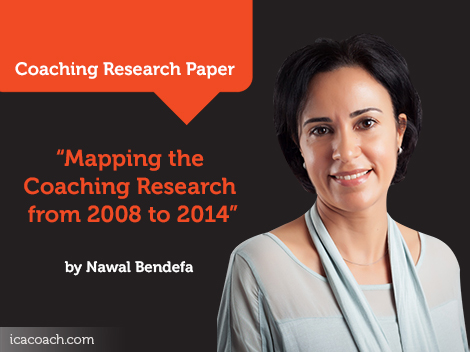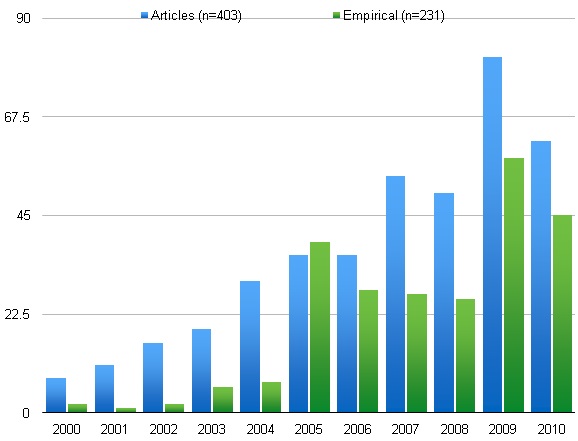 Research Paper By Nawal Bendefa
Research Paper By Nawal Bendefa
(Career Coach, SINGAPORE)
This paper is a small and humble contribution to the area of research in coaching. The lists of authors and bibliographies cited are not exhaustive, it only highlight the work of the most important and well-known authors as A. Grant, L.Stern and S. Stout-Rostron among others.
I didn’t include any specific conclusions or evaluations, the main purpose of my work is to bring forward the importance of the research and the countless information we can find to support our work as coaches and our field as a real profession.
Mapping the coaching research from 2008 to 2014
New profession creates new knowledge, new skills and possibilities. A successful profession creates return on investment. A very successful profession creates curiosity.
Curiosity can be developed in many ways and one of them is research:
Does coaching really work? What are the best practices in the field? Who are the best coaches? what are the most successful processes and tools? What comes first while choosing a coach: the coach skills, knowledge, experience or the coaching relationship?And so many other interrogations and questions. Of course, answers can be obtained by informal channels and casual discussions.
There is another way, more formal, is to look for empirical based research.
In this article, I will take you to a journey of mapping the coaching research:
- What are the topics which have been researched?
- By whom and when?
- Where could we find the information?
What outcomes and impacts can we expect from coaching research?
For my personal point of view research can have a significant impact on the professionalisation of coaching:
I strongly believe that learning from related fields like leadership, psychology, cognitive behavioural therapy, psychotherapy and neuroscience can “fast track” us to having a solid research foundation for our beliefs.
As coaches, we believe in the process and in our clients and we create a space of self-awareness and change.
We could create the same space for ourselves using empirical based research: We could watch what’s really works in the coaching field, how it works and how we can develop the best models and processes to support our profession?
How many publications: Grant’s[1] review of the literature
The coaching literature has significantly grown in the last 10 years (Chart 1)
In his review Anthony Grant presents 2 kinds of publication : Articles and Empirical studies.
We can see that despite the sustainable growth, both of them has dropped from 2009 to 2010.
Chart 1: Types of Publications in Scholarly literature 2000 to 1st Jan 2011 (N=634)

What happens in the research field since 2008
I – The 100 ICRF research proposals by the International Coaching Research Forum[2] in 2008.
The ICRF was attended by a group of 40 internationally recognised researchers, coaching professionals and other coaching stakeholders with the purpose of fostering coaching research on a global scale. in fact they developed 100 coaching related research proposals “The hope is that these research ideas will be instrumental in prompting new coaching studies among researchers and graduate students, either by direct adoption or by inspiring new research ideas”
In order to present a rich panel of research proposals, the ICRF formed working groups focusing on the 6 areas.
I am presenting hereby the 6 areas with a brief description using keywords. The main purpose is to give a broad idea about what was suggested as research streams during this meeting. The document itself could be found in the link below[3].
- Society and diversity: what is the impact of some society and diversity aspects on coaching, like gender, culture, health…
- Modalities and process: coach and coachee relationship, supervision, contract, coaching process, coach ability of the client, what happens in a coaching session? what are the different coaches approaches?
- Defining coaching: the essential elements that defines coaches, what coaching interaction do people find helpful? What is the business of coaching and how is the development of coaching as a global profession?
- Training, development, knowledge base & theoretical frameworks: understanding the coaching education and the relation between theory and practice. Are coaches aware of the theoretical foundation of their practice? What makes an excellent coach?
- Outcomes and methodology: What is the impact of health coaching, wellness coaching? What are the strengths and limitations of coaching? what causes coaching failures? How to measure the goal attainment? What is the impact of coaching within organisations?
- Coaching style, approach and core competencies: How can expertise in coaching be defined, learned and developed? Competent vs masterful coach? What coaching competences are related with successful client outcomes? what are the common core competencies?
The group of researcher suggested 100 specific topics in the 6 areas providing the research question, the methodology, the hypothesised results and potential implication for each topic.
The question is: What evidence based researches have been produced since 2008?
To answer this question, Stern and Stout-Rostron compiled abstracts of peer-reviewed journal articles published between January 2011 and June 2012.
II- Bibliography of coaching research abstracts by Stern and Stout-Rostron
The two authors[4] covered the publications from January 2011 to June 2012 that have reviewed the 100 coaching research proposals produced by the ICRF and prepared a list of 16 main focus based on the frequency of the questions and categorical aggregate of themes[5].
The bibliography includes abstracts of journals and dissertations with a large scope of primary research or research whose purpose is to identify best practices available to coaches.
The authors have chosen english language peer-reviewed journals published in USA, UK, Australia, Canada and South Africa. They excluded sport coaching and articles in which the authors simply express opinions, comments or promotional expositions.
Table 1 shows the 16 themes ranked by the number of articles (column 3). In column 4 you can read the topics proposed by ICRF and re-classified by Stern & Stout-Rostron.
The greatest number of studies were conducted regarding ‘coaching process’ followed by ‘coaching outcomes’, ‘ coaching in organisations’ , ‘coaches” and ‘coaching vs. other helping practices’
In addition to the 16 areas, the authors identified 89 more specific research themes that were studied during the same period.
Table 1: Coaching focus areas vs number of articles published
| Coaching Focus areas | Number of articles and dissertations | Topics proposal by ICRF in 2008 and re-classified by Stern & Stout-Rostron | |
| 6 | Coaching process | 88 | What is being done, directive vs non-directive, use of questions, assignments, feedback, coaching approaches and impact… |
| 3 | Coaching Outcomes | 46 | relationship with satisfaction, effectiveness, well-being… |
| 4 | Coaching in Organizations | 22 | Who, why, outcomes, internal systems for support… |
| 5 | Coaches | 16 | Competencies, characteristics and practices, theoretical awareness and application… |
| 10 | Coaching vs other helping practices | 15 | When should coaching be used vs. something else and what differentiates coaching? |
| 1 | Coach education and training | 12 | Self-directed classroom, practice, supervision |
| 9 | The business of coaching | 12 | professionnalisation of coaching (policy, ethics abs governance) … |
| 14 | Coaching readiness by the coachee | 12 | Criteria to evaluate, decision-making?… |
| 2 | Coaching relationship | 11 | Chemistry, matching factors, gender… |
| 15 | Use of assessment in coaching | 8 | What is done, how does it help? what is the impact? |
| 7 | Research methods and finding in coaching | 7 | Outcome measures, goal-attainment measures… |
| 8 | Supervision practices | 5 | How contracted and conducted, the impact on coach accountability and visible behavioural change… |
| 12 | Peer coaching | 5 | Peer coaching in coach education and development programmes… |
| 11 | How coaching differs by geographic region | 2 | Activities, theories, assumptions, processes, impact of language, contracting…. |
| 16 | Impact of coaching in Society | 2 | How coaching is moving from organisations/institutions out into the broader community, and what is its positive impact? |
| 13 | Contracting | 0 | The formal and informal agreement between coachees, client organisations, guidelines for confidentiality… |
III- ICF research
The International coaching Federation conducts regular research to show the trends in the industry and demonstrate the effective nature of coaching.
The last global coaching study was conducted in 2012. In 2014, we can find 2 studies, the consumer awareness study and building a coaching culture.
ICF hosts a research portal for members to submit they research in different languages.
Here is an overview about ICF global coaching study 2006 vs 2012.
We can see (table 2) that the average Annual revenue dropped down between 2006 and 2012. There are more female coaches in Asia and less female coaches worldwide